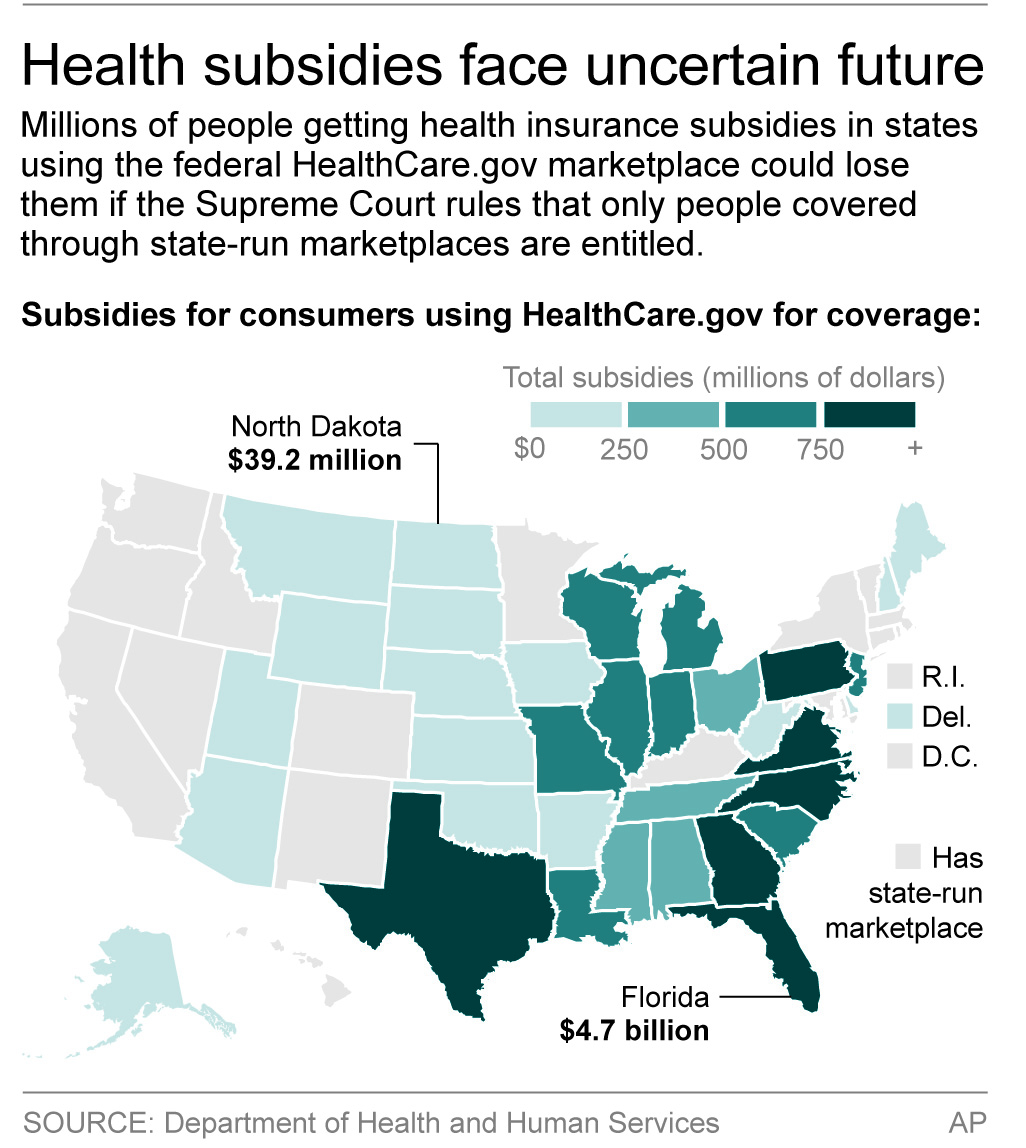If the Supreme Court invalidates federal health insurance subsidies for individuals living in up to 37 states, Republicans would be open to a variety of policy responses to keep financial assistance flowing to those already enrolled in President Obama’s healthcare law.
But conversations with Republican lawmakers and aides in both the House and Senate indicate there is one red line that the GOP won’t be willing to cross. Simply put: A GOP Congress will never permanently extend the subsidies that were just declared illegal so that new enrollees could claim Obamacare benefits.
“This should be a short-term fix,” Rep. Bill Flores, R-Tex., who serves as chairman of the conservative Republican Study Committee, said of a response to a potential Supreme Court decision. “There shouldn’t be anything that allows this short-term fix to ultimately become a permanent extension of the subsidies.”
Though there are currently differences among Republicans on the details of any response, when it comes to this red line, Flores said, the view among Republicans “is about as close to unanimous as you can get.”
This means that the question of whether financial assistance survives any Supreme Court decision will hinge on whether Obama and his fellow Democrats are willing to accept some sort of temporary solution.
At issue in the current case, King v. Burwell, is that the text of Obamacare says that the law’s insurance subsidies were to be made available to individuals obtaining coverage through an “exchange established by the state,” but a rule released by the Internal Revenue Service subsequently instructed that subsidies could also flow to exchanges set up on behalf of states by the federal government.
If justices rule that the IRS acted illegally, then it would wipe out subsidies for individuals in up to 37 states relying in some way on the federal healthcare.gov insurance website.
The decision would also have numerous implications beyond that. It would effectively eliminate the employer mandate in those states, because Obamacare’s penalties on businesses that don’t offer acceptable health insurance are only triggered when a worker obtains federal subsidies. Without the subsidies, there is no employer mandate.
The decision would also weaken the individual mandate in those same states. Because individuals would now be exposed to the full cost of Obamacare insurance policies, more of them would be able to claim an affordability exemption from the requirement to purchase insurance.
For Obama and Democrats, the message would be clear in the event of an adverse ruling: Congress should pass a simple, one-page fix, updating the text of the law to specify that subsides can flow through exchanges established by the state or the federal government.
This message would be accompanied by an aggressive campaign to highlight those with illnesses who would be losing insurance without the subsidies, and blaming Republicans for their predicament.
Republicans are worried about the public backlash that could ensue ahead of an election year. But on the other hand, simply passing the one-page fix would be a non-starter.
It would not only require hundreds of billions of dollars of spending to restore the subsidies, it would also effectively re-impose the employer mandate and bolster the individual mandate in two-thirds of the states. After battling Obamacare for six years — and gaining power in no small part due to the backlash against the law — passing legislation to expand it would be a historic betrayal of limited government principles and of voters who gave Republicans the majority.

“Let’s be clear: If the Supreme Court rules against the administration, Congress will not pass a so called ‘one-sentence’ fake fix,” Sen. John Barasso, R-Wyo., one of the Republicans who has raised alarms about the need for a GOP policy response, has declared.
There are currently several competing plans offered by Republicans as a possible response to a decision against Obama. Those from Sen. Ron Johnson, R-Wis., and another from Sen. Ben Sasse, R-Neb., have been the most detailed.
Generally speaking, these plans (and other ideas being batted around by Republicans more informally) would offer some sort of temporary financial assistance to those who currently receive Obamacare benefits in states relying on the federal exchange. But none of the plans currently being considered would allow Obamacare to offer subsidies to new enrollees in these states.
The ultimate goal is to push the issue to 2017, when, in theory, a Republican president would be in a position to repeal Obamacare and replace it with a more comprehensive alternative. This much isn’t possible as long as Obama is in office.
Some conservative Republicans, no doubt, would refuse to vote for any plan that restores federal financial assistance. Among the rest, there are important differences that would need to be worked out relating to the mechanism that would be used to provide temporary financial assistance, how such assistance would be paid for and what type of concessions Republicans might demand from Democrats.
Ultimately, these differences are resolvable. At least, there’s enough common ground to get Republicans to the point at which there would be a critical mass of GOP votes, with some Democratic help, to provide temporary financial assistance.
At that point, the question would be whether Obama and Democrats would prefer to press what they see as their political advantage, and hold out for a “fix” that would permanently extend the subsidies. If that’s the case, and Democrats draw their own red line at permanent subsidies, then nothing will get done in Washington, and the big fight will move to the states.
